Femia > Health Library > Getting Pregnant > Planning pregnancy > Signs of pregnancy after Depo-Provera
Signs of pregnancy after Depo-Provera
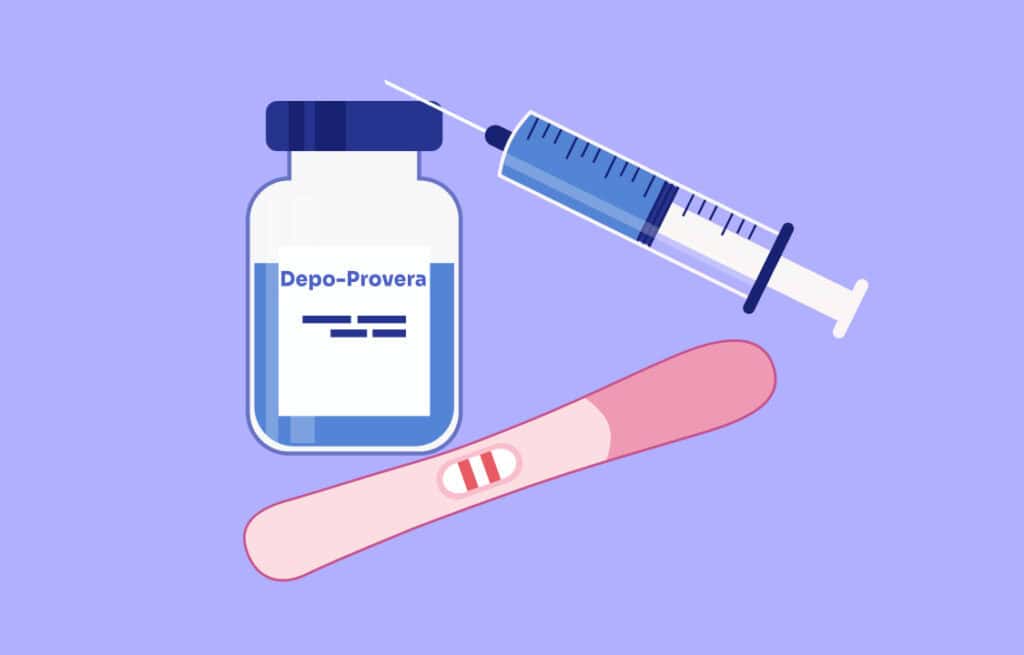
- Updated Mar 1, 2025
- Published
CRAFTED BY HUMAN
Crafted by human At Femia, we provide accurate and up-to-date information at every stage of your journey, from trying to conceive, pregnancy and postnatal support. All content is created by a real person based on in-depth research and own professional experience. Femia ensures that you will receive expert advice, strict accuracy and a personalized approach from our authors/medical experts. Learn more about our editorial policy.
FACT CHECKED
Fact checked At Femia Health, we maintain the highest standards of editorial excellence in delivering content focused on helping you conceive, guiding you through pregnancy, and supporting you postpartum. Explore our content review principles to learn how we ensure the accuracy and quality of our health and lifestyle tips for every stage of your journey.

Medically reviewed by Hector Chapa, MD, FACOG, Clinical associate professor, Obstetrics and Gynecology Texas A&M University, College of Medicine in Bryan-College Station, USA
Unlike other birth control methods, Depo-Provera may impact fertility in the months after use. You should stop using Depo-Provera around 12 months before you hope to fall pregnant, though be aware it may happen as soon as four months after your last shot in some cases.
While you may be waiting for your period to signal the return of your fertility, you can, in fact, conceive even if you haven’t gotten it yet. Early signs of pregnancy after stopping Depo-Provera can include nausea, breast tenderness, fatigue, and frequent urination.
Depo-Provera (medroxyprogesterone) is a birth control injection that is over 99% effective at preventing pregnancy. Commonly known as the birth control shot, many women choose this method of birth control because they won’t have to remember to take a pill every day. You only need four doses each year, making it a hassle-free contraceptive choice.
While it’s a fantastic contraceptive option, many women worry about how quickly they’ll be able to get pregnant after stopping Depo-Provera. If you’re thinking of starting a family soon, it may be time to reassess your contraceptive choices. Each Depo-Provera shot lasts three months, so you’ll need to plan ahead for when you want to start a family. It can take time for your fertility to return after your last injection.
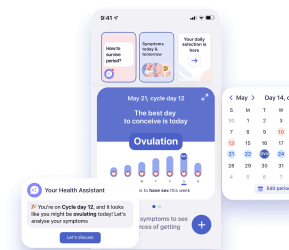
No period after stopping Depo: Can I still get pregnant?
Your periods may not return immediately after stopping Depo-Provera. The shot contains progestin, which prevents ovulation. The injection lasts three months, so it will be at least four months after your last shot before you can conceive, though it can take much longer for fertility to return.
Progestin is a synthetic hormone similar to Progesterone. It can build up in the body while taking Depo-Provera shots and take time to clear, delaying the return of ovulation. The researchers behind a 2023 cross-sectional study published in Plos One thought the excessive weight gain experienced by women on Depo-Provera may be behind the delay of fertility return for some users.
Many assume those who take Depo the longest will face the biggest delay in their fertility return, but this isn’t actually the case. It’s unclear why some women’s fertility takes longer to return. There’s no way of predicting how long it will take until your cycle returns, but if it’s been over three months since your last shot, you should assume it’s possible to fall pregnant.
While you may be waiting for your period to signal the return of your fertility, you can, in fact, conceive even if you haven’t gotten it yet. If ovulation occurs first and you fall pregnant that first month, you may not get a period between your last Depo shot and the conception of your child.
An easy way to monitor whether you’re ovulating is to pay close attention to your cervical mucus. During ovulation, your cervical mucus becomes slippery and stretchy; it should stretch between your thumb and index finger if you gently pull them apart, for example.
Conception occurs during ovulation. Signs of ovulation include:
- Wet, stretchy, and slippery cervical mucus
- Bloating and abdominal discomfort
- Mood swings
- Changes to your basal body temperature
If you want to know whether you’re ovulating, use an at-home ovulation kit each morning. Like a pregnancy test, these kits check for the luteinizing hormone (LH) that occurs before ovulation. The cost of daily ovulation tests can soon add up, but a 2020 study published in the Journal of Women’s Health found that ovulation testing can improve the likelihood of falling pregnant within two cycles.
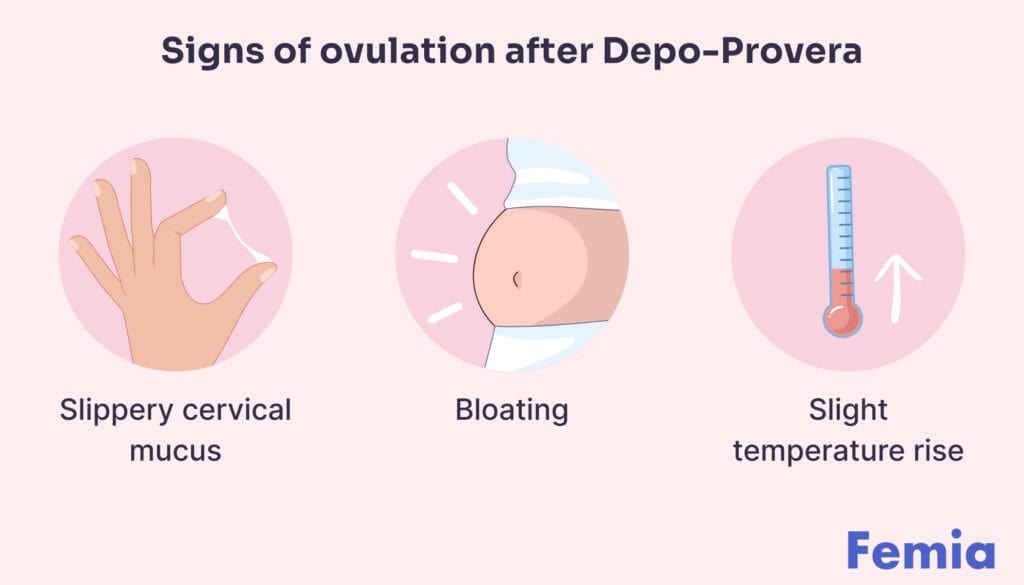
Does Depo cause infertility?
Depo-Provera works by preventing ovulation and causing temporary infertility. It may take a few months for fertility to return after ceasing use of this birth control method. A 2020 study published in the British Medical Journal found that although fertility was temporarily delayed with Depo-Provera, there was no lasting impact on a woman’s chance of conceiving once fertility had returned.
The use of Depo-Provera won’t impact your long-term fertility, though it does mean you need to plan ahead when deciding to start a family. If you know you want to try for a baby soon, Depo-Provera might not be the best contraceptive choice for you. If you know you want to get pregnant within the next year, consider more short-term methods.
How long it takes to get pregnant after Depo-Provera
Depo-Provera can impact fertility in the months after stopping use. According to Pfizer, the pharmaceutical company behind Depo-Provera, 68% of women trying to conceive will fall pregnant within twelve months of their last injection. According to a large US study, 93% of women conceived within 18 months of their final dose. The median time to conceive was 10 months.
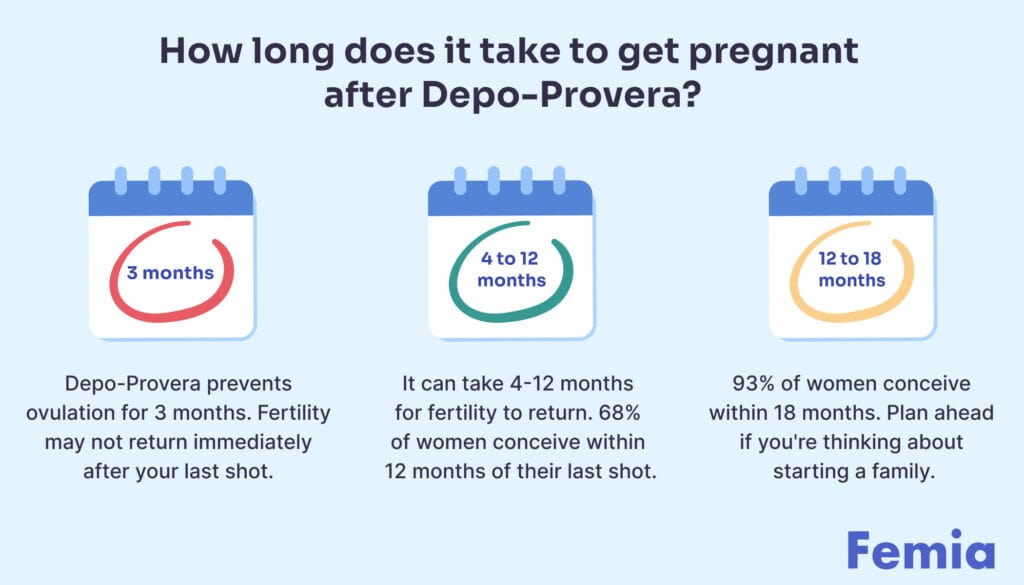
Tips on getting pregnant after Depo-Provera
It’s always tricky to decide when to start trying for a baby. Second-guessing nature doesn’t always go to plan. You may assume it’ll take a while only for it to happen sooner, or think you’ll fall pregnant fast only to spend months agonizing over those two-week waits.
After using Depo, it can take months for your fertility to return, so you’ll need to factor this in when deciding to start a family. You may want to aim to have your last Depo-Provera shot around one year before you’re hoping to fall pregnant, but know there’s a risk it will happen sooner.
You may notice some symptoms when you stop taking Depo-Provera, and these symptoms are similar to those of early pregnancy. The following signs could be withdrawal symptoms from the birth control shot:
- Missed period
- Fatigue
- Breast tenderness
- Nausea
- Bloating
Using the pregnancy app can help you monitor your symptoms after you stop taking Depo-Provera and help you figure out if they are early signs of pregnancy. If you notice pregnancy symptoms, you can purchase a home pregnancy test to find out for sure.
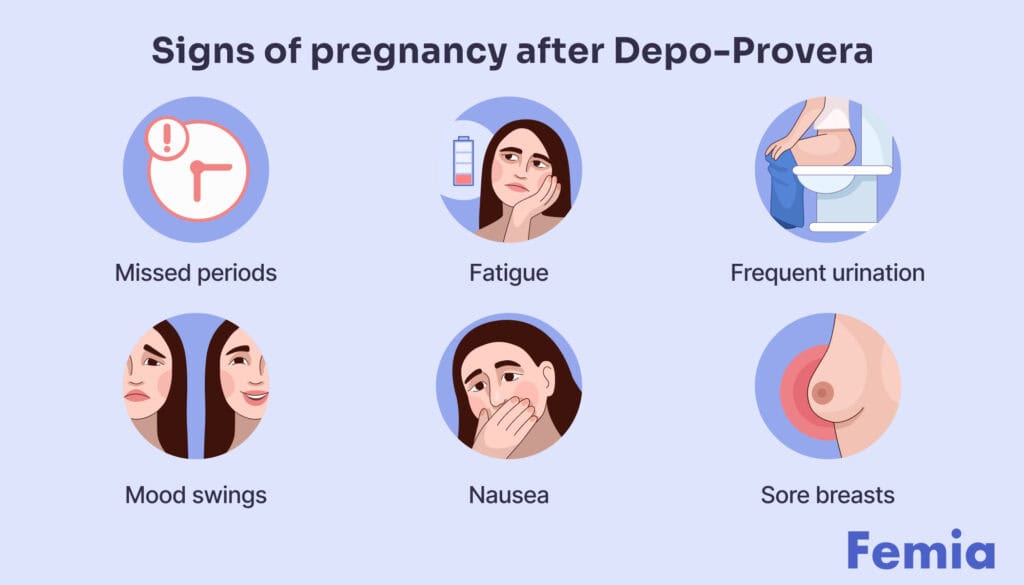
The three-month period after your final Depo-Provera injection is the perfect time to ensure your health is in order and ready to conceive. Here are some easy steps you can take to improve your health and make positive changes to be ready for pregnancy:
- Start a daily exercise routine.
Now is the perfect time to work on your fitness and improve your stamina in preparation for pregnancy and birth. Pregnancy puts a considerable strain on your body, so the fitter you are, the better. - Start taking prenatal vitamins.
Taking prenatal vitamins in the months before conception helps to prepare your body for pregnancy. Daily prenatal vitamins will help build your stores of crucial vitamins and minerals essential for a healthy pregnancy. - Quit smoking and drinking.
If you smoke, now is the time to quit. Don’t wait until you are pregnant to give up. It’s also a good idea to reduce (or even entirely stop) your alcohol consumption. Alcohol is known to impact fertility, reducing your chance of conceiving. It’s not just women who should reduce their alcohol consumption to conceive; a 2022 study published in the International Journal for Environmental Research and Public Health found that alcohol consumption negatively impacts male fertility, as well.
You should contact a fertility specialist or make an appointment to see your OBGYN if:
- You have additional barriers to pregnancy (such as endometriosis, for example)
- You haven’t conceived within 12 months of trying
- You are age 35 or older and haven’t conceived within six months of trying
- You think you may have fertility problems
Some women conceive the fourth month after their last Depo shot, so it is possible to fall pregnant quickly. Unfortunately, the only thing you can do is wait and see how long it takes.
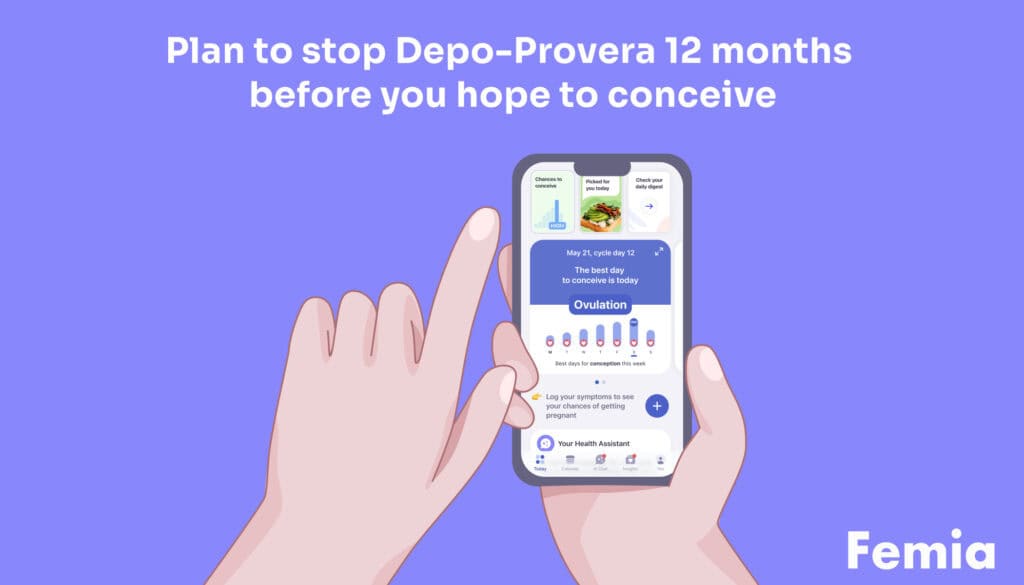
How to tell if you're pregnant while on Depo
Depo-Provera is over 99% effective. The shot contains the hormone progestin, which prevents ovulation and stops your body from releasing an egg each month. The contraceptive also thickens your cervical mucus to prevent sperm from reaching your uterus. Finally, Depo also thins the lining of your uterus, making it more difficult for a fertilized egg to embed. All in all, it’s a pretty reliable form of contraception.
However, while falling pregnant on this contraceptive method is rare, it does happen. Those who do become pregnant often don’t realize it until after the first trimester, because the contraceptive’s side effects mask some of the symptoms of early pregnancy.
One of the most common early pregnancy symptoms is an absent period, but the use of Depo-Provera means many women don’t have regular cycles anyway.
Symptoms of early pregnancy on Depo-Provera include:
- Missed periods
- Fatigue
- Nausea
- Sore breasts
- Moodswings
- Needing to pee more than normal
- Food aversions
You may mistake these early pregnancy signs as side effects of Depo-Provera. Pay attention to any unusual symptoms in your body, but remind yourself that getting pregnant on Depo-Provera is incredibly rare. If you think you might be pregnant, take a pregnancy test without delay. If the result is positive, contact your healthcare provider for advice.

The bottom line
Depo-Provera is an effective contraceptive method. The main downside to Depo is that it can delay the return of fertility, meaning some women have to wait before they can conceive after coming off the shots. The effect on the body varies between women, so it’s impossible to estimate how long it will be until your cycle returns.
If you want to get pregnant within the next year, you should stop taking Depo-Provera now. Speak to your OBGYN for advice about selecting a short-term contraceptive method in the meantime. After stopping Depo-Provera, you should pay attention to your body and look out for signs that ovulation is occurring. An ovulation testing kit may help you pinpoint ovulation and improve your chances of pregnancy.
If you have concerns about your fertility or how long it’s taking you to conceive, speak to your OBYGN. They will offer support, information, and tips to help you enjoy a healthy pregnancy.
References
- Damtie Y, Kefale B, Arefaynie M, Yalew M, Adane B (2023) Fertility return after hormonal contraceptive discontinuation and associated factors among women attended Family Guidance Association of Ethiopia Dessie model clinic, Northeast Ethiopia: A cross-sectional study. PLOS ONE 18(7): e0287440. https://doi.org/10.1371/journal.pone.0287440
- Johnson S, Stanford JB, Warren G, Bond S, Bench-Capon S, Zinaman MJ. Increased Likelihood of Pregnancy Using an App-Connected Ovulation Test System: A Randomized Controlled Trial. J Womens Health (Larchmt). 2020 Jan;29(1):84-90. doi: 10.1089/jwh.2019.7850. Epub 2019 Sep 4. PMID: 31483187; PMCID: PMC6983750.
- DEPO-PROVERA® CI Warnings and Precautions https://www.pfizermedicalinformation.com/depo-provera/warnings
- Yland JJ, Bresnick KA, Hatch EE, et al. Pregravid contraceptive use and fecundability: prospective cohort study. BMJ. 2020;371:m3966. Published 2020 Nov 11. doi:10.1136/bmj.m3966.
- Finelli R, Mottola F, Agarwal A. Impact of Alcohol Consumption on Male Fertility Potential: A Narrative Review. Int J Environ Res Public Health. 2021 Dec 29;19(1):328. doi: 10.3390/ijerph19010328. PMID: 35010587; PMCID: PMC8751073.

What causes yeast infection while pregnant? Click to read a comprehensive guide with an explanation of causes, symptoms, and safe treatment options for yeast infection.
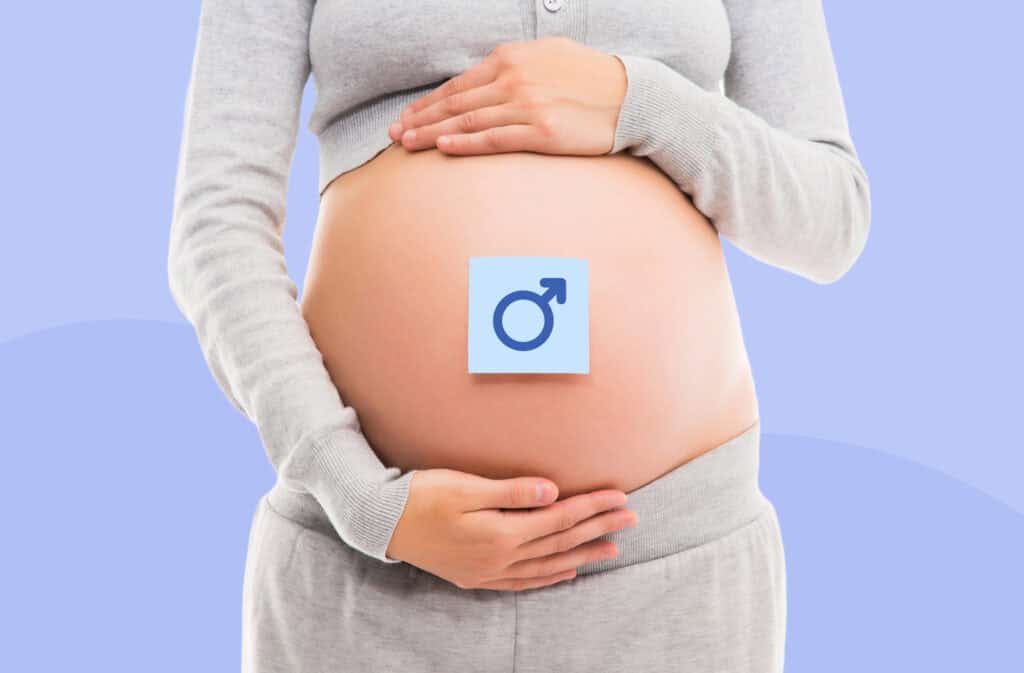
Explore methods like the Shettles method and medical interventions for conceiving a boy. Learn about effectiveness, myths, and your real chances based on science.

Why won’t my 7-month-old sleep? Click to learn what a 7-month sleep regression is, what causes it, what the signs are, and how to help your baby sleep better.
